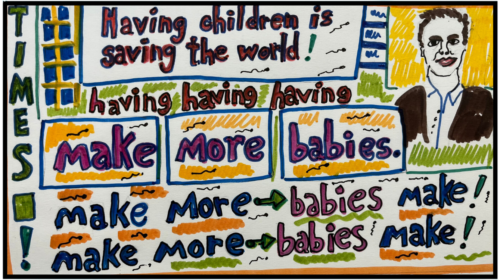Family/Household

Having Children and Saving the World
Pro-natalists don’t seem to realize that “having” children requires both caring and paying for them.
The Political Economy of Care
A graduate class taught by Jocelyn Olcott in the Revaluing Care Lab at the Franklin Humanities Institute on sustaining households, communities, and environments. Every Wednesday from 4:40 to 7:10 pm at the Smith Warehouse, Bay 4, C106.

Would Care Be a Gift?
Care as a gift places us all as caretakers *and* caregivers, in a reciprocity dynamic in which our autonomy is directly connected to the moments in which we were not and will not be autonomous. In this sense, care cannot be commodified nor mediated by the market as a mere product of capitalism.

Capital for the Kids
A quick look at small moves toward a guaranteed basic income for kids in the U.S. and Canada.

Nurturing Uncertainty: How Recuperation Retreats Foster Care Communities in Post-Meltdown Japan
Recuperation retreats that have emerged following the Fukushima Daiichi nuclear disaster in Japan stand as a powerful example of how experimental practices of care foster transformative communities in the midst of enduring uncertainty.

The Home, School, and Street: Exploring the Everyday Geographies of Caregiving Youth
Drawing on findings from a multi-year, mixed-method research project in collaboration with caregiving youth, young people under the age of 18 who take on caregiving responsibilities to support a parent, guardian, relative, or sibling who is chronically ill, disabled, or otherwise requiring care for medical reasons, we offer a critical examination of the ways young people’s everyday geographies of care in the home, the school, and the street, illustrate the importance of understanding ableism not only as oppression of the nonnormative body-mind, but also as the repression of the ability to give and receive care.

Glass Walls and Finance Capital
Alicia Girón’s open-access book Economía de la vida offers a comparative perspective on the ways that financialized capitalism has shaped the care economy.

Global Perspectives on Care and COVID
A new collection of essays looks back on a global crisis that became a care catastrophe.

Beyond Privilege: Narrating Diverse Stories of Caring Masculinities
New research on “caring masculinities” challenges traditional gender norms by examining men’s relationality, vulnerability, and nurturing qualities.

Taxing the Stork
New empirical research reveals why European family support policies, while far more generous than those of the U.S., are not as “pro-parent” as they claim to be

The U.S. Child Care Crunch
Stripped of support provided during the pandemic, the child-care industry is cracking up

The Uncaring Rewards of Paid Care
Field research conducted in Teeside in northeast England highlights the links between precarity and low pay for workers providing long-term care.